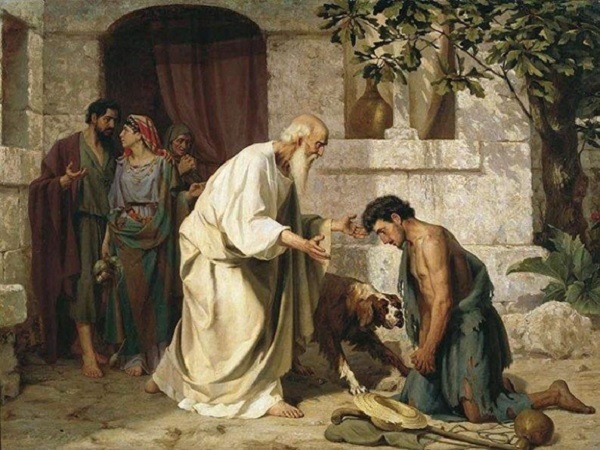Repentance: return from exile in the world
13 February 2023Through its graphic narrative, the Gospel parable of the prodigal son depicts the mystery of human iniquity and also the majesty of God’s acceptance and love. In an unsurpassed manner, it presents the human fall and repentance, apostasy and return.
Our vagrancy in the world.
The younger son ‘departed to a far-off country’. The sacred text tells us that the prodigal left and abandoned his home, going away to a distant, foreign land. The symbolic depth of this image is important. Strange though it may seem to us, our life in this world is also a departure, an exile in a foreign land. This is because our sojourn in the world turns the truth about God upside down. It clouds our thinking and erodes our spiritual sensibilities. It overturns the fixed values and criteria with which we weigh the things of the world and evaluate the priorities of life.

We live in a world that’s unable to recognize and trust God as its creator and savior, as Saint John the Evangelist confirms: ‘He was in the world and the world was made through him and the world did not know him’. Christ came into the world, which he had created, but he wasn’t recognized by it. The course of our life becomes an exile when we see for ourselves that this world, which was created by God, has surrendered and is under the sway of the ‘ruler of this age’. The outlook of the world expands and is separated from that of God by a vertical dividing line since ‘whoever is a friend of the world becomes the enemy of God’.
People today live in exile and are estranged from God, since they waste his multiple gifts in a prodigal manner, with no conditions or limits. They live as if there were no God, as if Christ hadn’t come to earth; and then the tragedy of their exile becomes all the more bitter. In their efforts to taste and enjoy the riches of life, to acquire and hang on to many things, they usually pay a high price.
Return to the house of God the Father
The house of the father is the model and image of our true life and communion with God in his kingdom. The teaching of the Church and the experience of the saints confirm this as reality. They urge us to return from the blind alley of the exile of the prodigal. The Gospel parable and the hymns of the penitential period we’re experiencing help us to revisit out spiritual state through this perspective: ‘He came to himself’ (Luke 15, 7).
When we find our true self, we regain the path for our return and reconnection with God. Then repentance becomes deeply lived, a spiritual experience of God’s grace which cures us of the sickness of sin. Then our struggle acquires a different meaning and dynamic. This means that even if our lapses and weaknesses are frequent, they no longer plunge us into despair. Even if our passions and mistakes are great and try us sorely, they no longer terrify us. No matter how heavy our guilts are, they don’t sicken our souls. Persistent guilt, depression, fear, anxiety, a wounded ego over the sins and mistakes we’ve committed are one thing; inner contrition, humility accompanied by spiritual serenity are quite another. This peace flows from the love and grace of God, who accepts us and awaits us, triumphing over our sinfulness.
My dear brothers and sisters, if we feel ‘existentially happy’, comfortable and at ease in this present world, then why would we seek to find a happiness that we don’t understand, that we don’t know we’ve lost, why would we even feel that we’re missing something? If we don’t feel exiled and estranged from communion with God, then why would we strive at all and where would we actually return to? Perhaps we should long for the lost joy on the opposite bank of real life, so that we can experience and confess that which was said by an Orthodox monk: ‘I believe in you, Lord, because outside you there’s nothing for me’. Amen.






